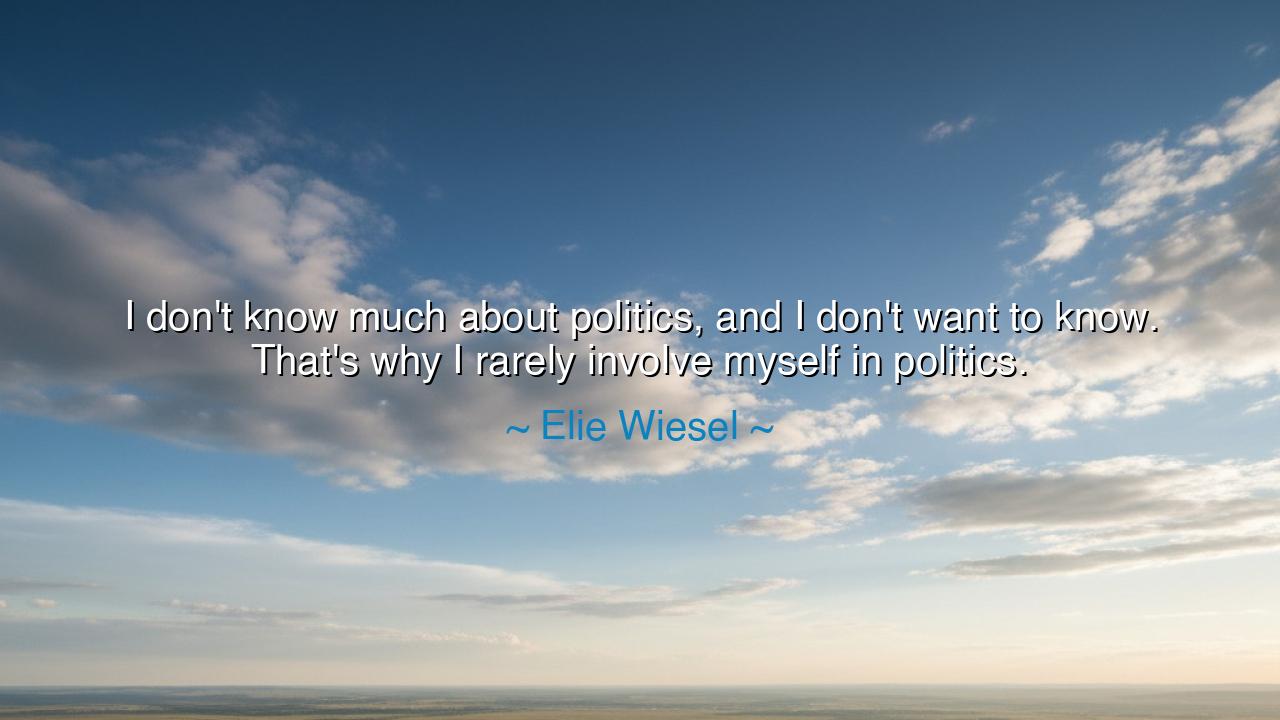
I don't know much about politics, and I don't want to know.
I don't know much about politics, and I don't want to know. That's why I rarely involve myself in politics.






The words of Elie Wiesel — “I don’t know much about politics, and I don’t want to know. That’s why I rarely involve myself in politics.” — come not from ignorance, but from deep sorrow and clarity. Wiesel, survivor of the Holocaust and witness to humanity’s darkest hour, understood that politics can often become a theater of power, ambition, and compromise, while the true calling of his life was remembrance, testimony, and moral witness. He did not despise politics out of indifference, but because he had seen where its corruption could lead when it forgets humanity.
The meaning of his words lies in the contrast between politics and morality. Wiesel chose not the path of political maneuvering, but the path of conscience. For him, the danger of immersing in politics was that it could dilute the purity of his mission: to speak for the dead, to remind the living, and to awaken the world’s soul against indifference. To be entangled in debates of policy and party would, in his eyes, diminish the sacred weight of memory and testimony.
History bears witness to this distinction. After the horrors of Auschwitz, many survivors turned their pain into political struggle — some to rebuild nations, others to avenge their people. Wiesel, however, turned to the written and spoken word, bearing the flame of remembrance. His book Night did not argue for policy or party but cried out with eternal force: never forget. Like the prophets of old, he stood not in the councils of kings but on the margins, holding a mirror to humanity. In this way, his refusal to dwell in politics allowed his voice to transcend politics.
The origin of his declaration lies in humility as well. Wiesel often confessed that he was a teacher, a witness, a teller of stories, not a strategist or a ruler. He did not claim knowledge he did not seek, nor strength he did not desire. His power was in refusing to be what the world expected — a politician — and instead choosing to be what the world needed: a moral compass. By stepping outside politics, he gave his voice the authority to speak to all sides.
Therefore, O seekers of wisdom, learn from Wiesel’s example: there are times when the noblest task is not to seize power, but to bear witness. Let others argue about politics and its fleeting games; the greater calling may be to remind humanity of its soul, to speak of memory, compassion, and truth. As Wiesel teaches, one does not need to be a politician to change the course of history — one needs only the courage to speak for what is eternal.






DNThu Do Nguyet
Elie Wiesel’s reluctance to engage with politics brings up the idea of personal choice versus collective responsibility. It's easy to dismiss politics when it feels beyond our control, but could this disengagement lead to a lack of accountability in political systems? How do we motivate people who feel disconnected from the political process to get involved, even in small ways? What might we lose by opting out, and is there a way to strike a balance?
QAPham Quynh Anh
This quote by Elie Wiesel brings up an important point: the feeling of helplessness or lack of interest in politics. However, it also makes me wonder—by choosing not to participate, are we missing out on opportunities to influence change? What can we do to make politics more accessible and less daunting for people who feel disconnected? How can we create a system that encourages everyone to engage, even at a basic level, without feeling overwhelmed?
TBVu thanh Bui
Elie Wiesel's perspective on avoiding politics is something I think many people can relate to, especially when the political landscape feels toxic or overwhelming. But it also brings up a concern—if people opt out of political involvement, does that allow the voices of others to dominate? What are the consequences of disengagement, and how do we ensure that those who are disengaged don't leave room for harmful ideologies to thrive?
SNNgoc Son Nguyen
Wiesel’s quote speaks to the frustration that many people feel about the complexity of politics. It’s easy to retreat from something that feels overwhelming or out of control. However, I can’t help but ask: Can we really afford to be so passive? Even if we don't want to know the details, isn’t there a responsibility to stay informed about issues that directly affect our lives, like education, healthcare, or human rights?
CNPhuong Linh Cao Nguyen
Elie Wiesel’s statement seems to reflect a sense of disillusionment with politics, which resonates with many who feel that the system is corrupt or too complicated to understand. While it's understandable to want to distance oneself from politics, I wonder—can we afford to disengage entirely? Doesn't political participation, even in small ways, help shape the world we live in? How do we balance the desire for personal peace with the need for collective action?